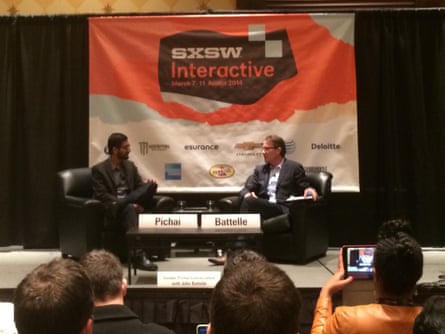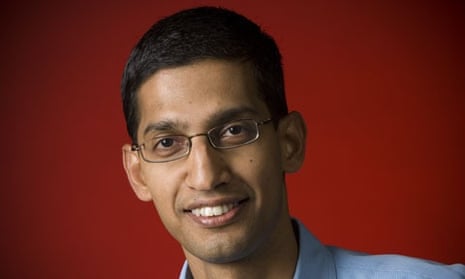Google is preparing to launch a software development kit for wearable devices later this month, as it encourages hardware firms to use Android in their smart watches, fitness trackers and other gadgets.
The plans were announced by the company’s senior vice president of Android, Chrome and Apps, Sundar Pichai, at the SXSW conference in Austin.
“In about two weeks, you will see us launch the first SDK for what we think of as Android for wearables,” said Pichai, after outlining Google’s vision of the wearable technology market.
“When we think of wearables, we think of it as a platform. We see a world of sensors... Sensors can be small and powerful, and gather a lot of information that can be useful for users. We want to build the right APIs for this world of sensors.”
He added that while smart watches and fitness gadgets are the two most obvious wearable categories, Google hopes that releasing its SDK will stimulate the development of a host of new devices. “I think we’re just scratching the surface,” he said.
However, Pichai – who added Android to his responsibilities in 2013 when its founder Andy Rubin moved on to other projects within Google – gave no hint about the company’s plans to make its own hardware. “From my standpoint and the team’s standpoint, we want to focus on the platform and the APIs.”
At SXSW, Pichai was interviewed on-stage by entrepreneur and investor John Battelle, who pressed him for details of Google’s Android licensing program – particularly reports of hidden clauses that require partners to set specific Google services as the default (search for example) if they want access to its core applications.
“Android is one of the most open systems I’ve ever seen. What makes Android great is it’s literally designed from the ground up to be customised in a very powerful way,” said Pichai, who pushed back on the idea that Google is too controlling.
“We do have business relationships, we do do licensing relationships and people want to use Google services on top of Android. But in theory you can use Android without Google. If you do a licensing arrangement, we do require our services to be installed, but it’s not exclusive – you can preload any other services you want.”
He was later pressed on the issue by an audience member, who noted that manufacturers setting certain non-Google apps as default on their Android devices would be barred from using its crown jewels.
“None of what we do is ever exclusive. Yes, we may require some services… but you are fully free as an OEM or carrier or partner to place other services on the phone,” he said, before declining to go into more details. “I can’t comment on specific things… these are business deals that you do on a partner-by-partner basis.”
The interview focused on various aspects of Google’s business, including the company’s recent $3.2bn acquisition of thermostat maker Nest, and how it fits into Google’s software strategy. Battelle wondered whether Nest’s products will integrate Chrome or Android, before jabbing “Will we have to join Google+ to turn off our thermostat?”
“Definitely not the second one!” said Pichai, who added that Google is focusing on an ecosystem spanning these devices and more. “We need a mesh layer, and a data layer in which this all comes together,” he said “We are thinking hard about the layer which will connect all these devices together.”
Pichai was asked about messaging app WhatsApp, which is being bought by Facebook for up to $19bn, but which is rumoured to have either fielded an alternative offer from Google, or agreed to notify the company if it was in acquisition talks with other big tech firms.
“We met with them recently. We were definitely interested in seeing them. They are one of the most successful companies on Android… But we did not make an offer to acquire them,” said Pichai, who said Google merely told WhatsApp that it was one of the major players within the Android ecosystem, offering unspecified “help” if required.
And the acquisition? “To me it’s evidence that the platform is working at scale,” he said. “This signifies that the smartphone platform is fundamentally changing how we communicate.”
The interview also touched on Chrome OS versus Android, with Pichai maintaining that Google has no immediate plans to merge the two. “We view them as building blocks. By investing in both, we believe that over time we will be able to meet almost all use cases,” he said. “We feel fortunate to have both.”
He declined to give a specific sales figure for Google’s Chromecast USB dongle for TVs, but said Google is excited by its performance so far. “We are in the millions now, and it’s growing very actively,” he said, while promising Chromecast will go on sale in “many more countries” in a few weeks’ time.

In the wide-ranging conversation, Pichai denied that Google is planning to buy up sports rights for YouTube transmission – “That’s a lot of money!” – while declining an invitation to finally announce YouTube’s long-rumoured music subscription service, which is thought to be on the verge of launching.
Pichai answered by asking the audience how many of them listen to music through YouTube already, provoking a healthy show of hands. “It shows there’s an opportunity there. For us, the amount of music consumed through YouTube is very, very interesting,” he said.
“To us, we see the synergies in how people play music and consume music in YouTube can be brought together in an interesting way. I think we can enhance the music experience for users.”
Pichai also expressed excitement about the potential of two new projects within Google: modular smartphone Project Ara – “you can think about it as an API for hardware” – and the sensor-based world-visualising Project Tango. “Things like Tango are definitely going to happen in the future. Your phone will be perfectly capable of it,” he said.
He defended Google against an accusation that it doesn’t fight hard enough on behalf of its Android partners against “Microsoft patent blackmail” – in the words of Battelle, referring to a succession of licensing deals Microsoft has struck to be paid by Android manufacturers for use of its IP.
“We do our best. It’s a tough problem,” said Pichai, describing the licensing payments as “a cost of doing business today” for Android partners, and suggesting that Google is lobbying the US Congress hard over patent reform rather than seeking a court battle with Microsoft on behalf of its manufacturers. “We do a lot of work behind the scenes,” he said.
Pichai also addressed rumours that he’d been in the running to be the next CEO of Microsoft, at least until the company appointed from within in the shape of Satya Nadella. Pichai suggested that Microsoft has big challenges going forward.
“I think they have some interesting decisions to make. If you’re running the company, a company that’s been built around Windows – the success of Windows – now faces a multi-platform world,” he said.
But would he have been tempted if he had been offered the role of Microsoft CEO, as several media reports predicted he would be? Pichai deflected the question with a joke. “I think they got confused with two people with Indian sounding names!”

Comments (…)
Sign in or create your Guardian account to join the discussion